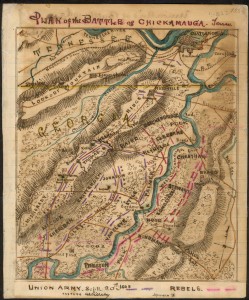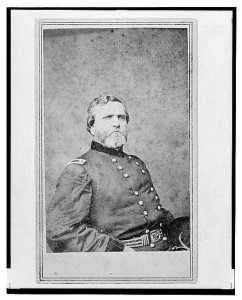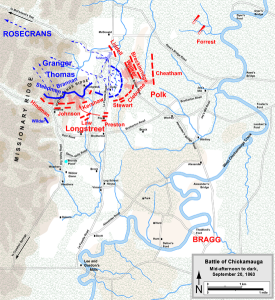or virtual victory?
I think I gave in to a little Yankee arrogance the other day when I noticed that Richmond seemed more in the dark about the battle at Chickamauga than the North. The New York Times apparently had a correspondent embedded with the Army of the Cumberland, but he did not seem to get a report back the next day as the bulk of Rosecrans’ army was hightailing it back to Chattanooga. What’s more, small towns in the North had to wait for accounts from the big cities, as can be seen from this article in a Seneca County, New York newspaper of September 1863:
Great Battle in Georgia.
The country was startled on Monday with the terrible news that Rosecrans had suffered defeat and disaster in Georgia, at the hands of the Confederate General Bragg. – The battle commenced on Saturday morning some little distance beyond Chattanooga, the enemy attacking our forces in overwhelming numbers. The engagement raged with great fury Saturday and Sunday, ending in the repulse of Rosecrans, and compelling him to fall back to Chattanooga. – The loss in killed and wounded on both sides is reported at 30,000. Both sides claim the victory, but it is evident that the advantage was with the rebels. The following dispatch published in the morning papers confirm the first reports received from Gen. Rosecrans army:
CINCINNATI, Sept. 24. – Mr. Shanks, the correspondent of the N.Y. Herald, has arrived here from the battle field of the Chickamanga [sic] where he has witnessed the two days fighting. He says:
That the official reports of the battle from Washington, are in the main totally false, and that really the army of the Cumberland have met with a defeat which must put it on the defensive for some time to come.
Gen. Thomas’ corps is the only one which did any fighting. On the first day it defeated Longstreet with terrible slaughter, driving him in great confusion for over a mile beyond the Chickamanga river.
Longstreet in a two hours fight lost 2,000 killed and over double that number in wounded.
Crittenden’s and McCook’s corps the same day were both badly beaten, and the enemy broke the center, driving Crittenden in every direction.
The defeat in this part of the line caused Thomas to abandon his field and fall back to protect his flank and re-establish his line. At the same time the enemy not knowing what he had accomplished failed to pursue the advantage, and Gens. Wood and Negley went in the center and re-established that part of the line. The day was ours though the enemy held the field.
We had taken three pieces of artillery more than we had lost on the first day, when Gen.Thomas had defeated Longstreet. On the second day he saved the army of Gen. Rosecrans from annihilation. – From 10 to 12 on Sunday he fought the enemy and repulsed them in three charges, when finding the assault in vain, the enemy pushed forward on the right and center, and on the first charge drove Crittenden’s and McCook’s line and routed their entire commands, driving them in a disgraceful manner into Rossville and Chattanooga.
Gen. Thomas, with his corps, still contested the day and was enabled by the timely reinforcements of Gen. Granger to hold a position until nightfall covered his retreat to Rossville.
Mr. Shanks left the field at 7 p.m. Sunday, and Chattanooga the noon of Monday.
Rosecrans was falling back on Chattanooga where he was perfectly safe from all Gen. Bragg could do.
His lines of communication were perfectly secure, and he had plenty of ammunition and provisions in Chattanooga to stand a month’s siege.
The result is virtually a defeat to us, as we have lost considerably in material, not less than fifty pieces of artillery falling into the enemy’s hands, though Bragg’s army receipts for twenty.
The rebel loss in killed and wounded will exceed our own. In killed he has lost double our number. Rosecrans is in no danger, but at the time Mr. Shanks left Chattanooga the danger to Gen. Burnside was very great.
Even The New York Times used the report of W.F.G. Shanks, although it did not mention him or his paper by name.
From The New-York Times September 25, 1863:
FROM ROSECRANS’ ARMY.; NO FIGHTING YESTERDAY. The Present Position of Our Forces Impregnable. HEAVY LOSSES ACKNOWLEDGED A New Account of the Result of the Battle. REPORTS FROM CINCINNATI.
WASHINGTON, Thursday, Sept. 24.
A dispatch from Gen. ROSECRANS, dated at his headquarters last night, says:
“I cannot be dislodged from my present position.”
Another dispatch from one of Gen. ROSECRANS’ Staff, written at forty minutes past 11 o’clock last night, says:
“No fighting to-day, the 23d.”
SECOND DISPATCH
WASHINGTON, Thursday, Sept. 24.
Advices received by the Government to-day from the Army of the Cumberland are to the effect that our wounded in the late three days’ battle before Chattanooga, have been conveyed to hospitals at Stevenson, and Bridgeport, in Alabama, and thence taken to Nashville as fast as they are physically able to be removed. The number of wounded recovered from the field, is not officially stated, nor whether any are now in the hands of the enemy.
CINCINNATI, Thursday, Sept. 24.
A gentleman, arrived here from the battle-field of Chicamauga, where he witnessed the two days’ fighting, says that the official reports of the battle, from Washington, are, in the main, totally false, and that really the Army of the Cumberland has met with a defeat which must put it on the defensive for some time to come.
Gen. THOMAS corps is really the only one which did any fighting. [and a recap of the rest of the report by its “informant”] …
In its October 10, 1863 issue Harper’s Weekly (at Son of the South) gave Mr. Shanks credit for the report they used and then then spun the battle like others in the North. Chattanooga was the key. As long as Rosecrans held Chattanooga, Chickamauga would be no more than the rebels’ Bunker Hill, a victory with no strategic value. It was predicted that both sides would reinforce their armies there:
Thus the issue would seem to be one of time. If Rosecrans can not hold out at Chattanooga until his reinforcements arrive, the whole of the Southern army will presently be in Chattanooga, and marching Northward through Tennessee; if he can hold out a few days only he will have force enough to offer Bragg battle with advantage, and can proceed at his leisure to occupy Atlanta, and give the death-blow to the empire which it was proposed to erect upon the corner-stone of slavery.
Hal Jespersen’s map of September 20 afternoon is licensed by This entry was posted in 150 Years Ago This Week, Military Matters and tagged Battle of Chickamauga, George Henry Thomas. Bookmark the permalink.



